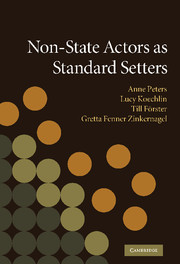Book contents
- Frontmatter
- Contents
- List of figures
- List of tables
- List of contributors
- Acknowledgements
- List of abbreviations
- Preface
- 1 Non-state actors as standard setters: framing the issue in an interdisciplinary fashion
- PART I New actors and processes in contemporary standard setting
- PART II The legitimacy and accountability of actors and standards
- PART III The authority and effectiveness of actors and standards
- Index
Preface
Published online by Cambridge University Press: 06 January 2010
- Frontmatter
- Contents
- List of figures
- List of tables
- List of contributors
- Acknowledgements
- List of abbreviations
- Preface
- 1 Non-state actors as standard setters: framing the issue in an interdisciplinary fashion
- PART I New actors and processes in contemporary standard setting
- PART II The legitimacy and accountability of actors and standards
- PART III The authority and effectiveness of actors and standards
- Index
Summary
The increasing pace of economic globalisation and liberalisation has made it obvious that the traditional nation state is no longer alone in the driving seat of regulation, especially in international trade relations. So-called ‘non-state actors’, a broad term encompassing intergovernmental organisations, non-governmental organisations, transnational corporations, as well as new forms of mixed standard setters such as ‘public–private partnerships’ (PPPs) or ‘multi-stakeholder groups’, are becoming increasingly involved in the business of regulation.
With the new actors come new forms of standard setting: the classic divide between state regulation, on the one hand, and self-regulation, on the other hand, is giving way to hybrid forms of co-regulation. The methodology of regulation is also changing rapidly. Especially at the international level, task forces are applying soft law and peer review mechanisms. Likewise, in the private sector, codes of conduct secured by para-judicial means are being introduced in many areas.
Furthermore, social scientists are rightly pointing out that for too long the legal discourses have focused on formal regulation only. They refer to the essential role of para-legal standard setting. The emergence of new actors, processes and regulatory types can be observed in many economically sensitive areas (competition, environmental, labour rules, etc.), as well as in human rights standards. Non-state actors, however, also play a key role in replacing formal governance in so-called ‘failing states’.
This book gives a broad insight into the multifaceted world of standard setting by non-state actors. It goes well beyond description.
- Type
- Chapter
- Information
- Non-State Actors as Standard Setters , pp. xix - xxPublisher: Cambridge University PressPrint publication year: 2009
- 1
- Cited by



